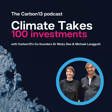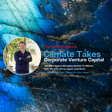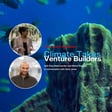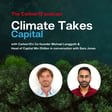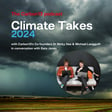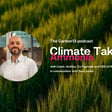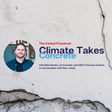
Climate Takes Critical Materials
Welcome to Carbon13’s podcast “Climate Takes” where we ask special guests for their “takes” on their industry and climate challenge, as well as setting a call to action, asking what will it take to solve the climate emergency?
Climate Takes Critical Materials covers the most global question of this podcast so far: the supply chains of critical materials. They are the stuff we need for the world's energy transition, its energy storage, and even the screen you're reading this on.
But, one battery maker alone can have over 10,000 suppliers. A renewable energy project can be killed entirely by a 6 month delay in materials supply.
So we talk to Sarah Montgomery, CEO of Infyos, an AI supply chain operating system for energy and mobility, built by experts in Chinese supply chain data supply chain disruption.
Subscribe to Climate Takes to find more content on founding and investing in climatetech, with Takes on green chemicals, innovative materials, AI, and hard won lessons in climate entrepreneurship.
